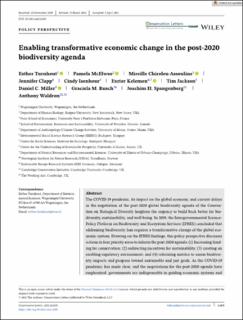Enabling transformative economic change in the post‐2020 biodiversity agenda
| dc.contributor.author | Turnhout, Esther | |
| dc.contributor.author | McElwee, Pamela | |
| dc.contributor.author | Chiroleu‐Assouline, Mireille | |
| dc.contributor.author | Clapp, Jennifer | |
| dc.contributor.author | Isenhour, Cindy | |
| dc.contributor.author | Kelemen, Eszter | |
| dc.contributor.author | Jackson, Tim | |
| dc.contributor.author | Miller, Daniel C. | |
| dc.contributor.author | Rusch, Graciela | |
| dc.contributor.author | Spangenberg, Joachim H. | |
| dc.contributor.author | Waldron, Anthony | |
| dc.date.accessioned | 2021-05-10T11:29:54Z | |
| dc.date.available | 2021-05-10T11:29:54Z | |
| dc.date.created | 2021-05-04T08:50:27Z | |
| dc.date.issued | 2021 | |
| dc.identifier.issn | 1755-263X | |
| dc.identifier.uri | https://hdl.handle.net/11250/2754640 | |
| dc.description.abstract | The COVID-19 pandemic, its impact on the global economy, and current delays in the negotiation of the post-2020 global biodiversity agenda of the Convention on Biological Diversity heighten the urgency to build back better for biodiversity, sustainability, and well-being. In 2019, the Intergovernmental Science Policy Platform on Biodiversity and Ecosystem Services (IPBES) concluded that addressing biodiversity loss requires a transformative change of the global economic system. Drawing on the IPBES findings, this policy perspective discusses actions in four priority areas to inform the post-2020 agenda: (1) Increasing funding for conservation; (2) redirecting incentives for sustainability; (3) creating an enabling regulatory environment; and (4) reforming metrics to assess biodiversity impacts and progress toward sustainable and just goals. As the COVID-19 pandemic has made clear, and the negotiations for the post-2020 agenda have emphasized, governments are indispensable in guiding economic systems and ust take an active role in transformations, along with businesses and civil society. These key actors must work together to implement actions that combine short-term impacts with structural change to shift economic systems away from a fixation with growth toward human and ecological well-being. The four priority areas discussed here provide opportunities for the post-2020 agenda to do so. biodiversity conservation, economic systems, green finance, incentives, metrics, policy, regulation, subsidies, trade, transformative change | en_US |
| dc.language.iso | eng | en_US |
| dc.rights | Navngivelse 4.0 Internasjonal | * |
| dc.rights.uri | http://creativecommons.org/licenses/by/4.0/deed.no | * |
| dc.title | Enabling transformative economic change in the post‐2020 biodiversity agenda | en_US |
| dc.type | Peer reviewed | en_US |
| dc.type | Journal article | en_US |
| dc.description.version | publishedVersion | en_US |
| dc.rights.holder | ©2021The Authors. | en_US |
| dc.subject.nsi | VDP::Zoologiske og botaniske fag: 480 | en_US |
| dc.subject.nsi | VDP::Zoology and botany: 480 | en_US |
| dc.source.journal | Conservation Letters | en_US |
| dc.identifier.doi | 10.1111/conl.12805 | |
| dc.identifier.cristin | 1907893 | |
| dc.relation.project | Egen institusjon: Norwegian institute for nature research (NINA) | en_US |
| dc.relation.project | Andre: Norwegian Environmental Agency | en_US |
| dc.relation.project | Andre: Rutgers: Dean's | en_US |
| cristin.ispublished | true | |
| cristin.fulltext | original | |
| cristin.qualitycode | 1 |
Tilhørende fil(er)
Denne innførselen finnes i følgende samling(er)
-
Publikasjoner fra CRIStin - NINA [2364]
-
Scientific publications [1392]
Vitenskapelige artikler, kapitler og monografier i Open Access.

